Unit6 A Day课后答案
人教版(2024)英语七年级上册 Unit 6 A Day Section B (1a-1d)课件
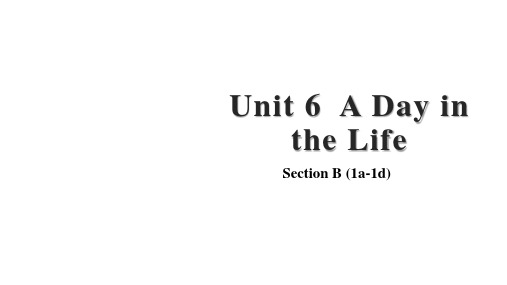
Language points
【拓展】finish用作及物动词时,其后可接名词或动词的-ing 形式作宾语。 Can you finish your homework? 你能做完你的家庭作业吗? Jack always finishes doing his homework before dinner. 杰克总是在晚饭前 做完他的家庭作业。
Language points
3. The afternoon lessons begin at 12:30 and finish at 2:15. 下午的课十二点 半开始,两点十五结束。 finish 作动词,意为“结束;完成”。finish与 start和 begin 意思相反, 在本句中用作不及物动词。 The meeting finishes at nine. 会议在九点结束。
finish at 2:15. Then I go to my ice hockey club. /ɔːlˈredi/ adv.已经;早已
I usually get home around 4:00. It’s already dark outside. I often have dinner
at 6:00. After that, I read with my parents for an hour. That’s an important
A. Timo’s School B. One of Timo’s School Days C. Timo’s Hobbies
The structure of the passage
Language points
1. It’s only a 10-minute walk. 仅仅步行十分钟的路程。 (1)only 作副词,意为“仅;只”。only 修饰主语以外的成分时,通常 置于实义动词之前,be动词、情态动词和助动词之后。 She only plays soccer after school. 放学后她只踢足球。 He is only a child. 他仅仅是个孩子。
剑桥国际少儿英语3 Unit 6 A day in the country. 故事课

Vedio call...
Key: Shall we ask Mrs Potts, too?
Lock: Yes, Key. Please go and ask her.
情态动词(用在疑问句中,与 I和we连用表示提出或征求意见) 应该,可以
What does Key want to do for Mrs Potts? What does Mrs Potts say?
They fall into the river. They haven't got the picnic. Mrs Potts catches a fish.
Presentation: Which episode is it? Describe the story.
The seventh episode
Lock? Shall I go to the
river and catch some
fish to eat?
Lock: Don’t be silly,
Key. We’ve got a big
picnic.
catch something to eat
抓点东西吃
例:I want to catch something to eat.
Potts? Shall I put this
blanket on you?
Mrs Potts: No, thank
you. It’s hot. I don’t
need a blanket.
She doesn't want to be disturbed. 她不想被打扰。
Do they need Key's help? How does Key feel?
【课件】Unit6+A+Day+in+the+Life+Section+A+课件人教版英语七年级上册
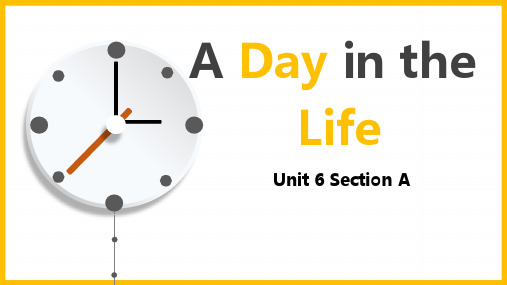
Mr. Wolf
正读 It's seven thirty. It's thirty past seven.
倒读
It's half past seven.
30mins=half
What’s the time, Mr. Wolf?
Mr. Wolf
正读 It's seven forty-five. It’s fifteen to eight.
What’s the time, Mr. Wolf?
It’s a quarter past seven.
Review
What’s the time, Mr. Wolf?
It’s twenty past seven.
Review
What’s the time, Mr. Wolf?
It’s half past seven.
2c Read again and complete Tom’s school day timetable
Unit 6 A Day in the Life 素质评价卷(含答案)-人教新目标版英语七年级上册

Unit 6 综合素质评价限时: 100分钟满分: 120分一、听力理解(20 小题,每小题1 分,共20 分)第一节听下面5 段对话。
每段对话后有一个小题,从题中所给的A、B、C 三个选项中选出最佳答案。
每段对话读两遍。
( )1. Who does Jack usually take a walk with?A. His mother.B. His sister.C. His father. ( )2. Where is the girl?A. In the classroom.B. At home.C. In the library. ( )3. What time is it?A. It’s 5:00.B. It’s 5:45.C. It’s 4:45.( )4. When does Mike’s mother get up?A. At 6:30.B. At 6:00.C. At 5:30.( )5. What does Helen sometimes do on weekends?A. Plays the piano.B. Cleans the room.C. Watches TV.第二节听下面几段对话或独白。
每段对话或独白后有几个小题,从题中所给的A、B、C 三个选项中选出最佳答案。
每段对话或独白读两遍。
听下面一段对话,回答第6 至第7 两个小题。
( )6. What does Cindy do on Sunday morning?A. She plays chess.B. She plays tennis.C. She plays the guitar.( )7. Who does Cindy usually play chess with?A. Her sister.B. Her father.C. Her friend.听下面一段对话,回答第8 至第9 两个小题。
( )8. What does David have for breakfast?A. Bread and milk.B. Bread and eggs.C. Eggs and milk. ( )9. What time does David go to school?A. At 6:30.B. At 7:00.C. At 7:30.听下面一段独白,回答第10 至第12 三个小题。
人教版(2024)七年级上册英语+Unit 6 A Day in the Life 单元练习题

Unit 6 A Day in the LifeⅠII 听录音,选出空格中正确的音标。
(读两遍)( ) 1. /kuːl/ A. /ð/ B. /s/ C. /θ/ ( ) 2. /'mjuːɪk/ A. /z/ B. /dʒ/ C. /s/ ( ) 3. /'fɪnɪ/ A. /ʒ/ B. /tʃ/ C. /ʃ/ ( ) 4. /'juːuəli/ A. /ʃ/ B. /ʒ/ C. /dʒ/ ( ) 5. /lʌn/ A. /θ/ B. /tʃ/ C. /ʒ/ ( ) 6. /ɒb/ A. /dʒ/ B. /ð/ C. /ʃ/ ( ) 7. /tuː/ A. /z/ B. /s/ C. /θ/ ( ) 8. /ɪs/ A. /tʃ/ B. /z/ C. /ð/ III听对话,写出你所听到的词,并跟读。
注意重读的单词。
(读两遍) A: Hi, Rick. You get to school so 1.. What time do you 2. get up? B: At 6:20 am. What about you?A: I often get up at 3. 6:40 am. What do you do after that?B: I sometimes take a 4. for a while. Then I brush my 5. .A: When do you have 6. ?B: At about 7:10. Then I go to school.A: What time does your first class 7. ?B: My first class is at 8 o’clock.A: When do you go home?B: At about 5:50. Then I have 8. at 6:00.A: What do you do in the evening?B: I do my 9.. Then I play sports 10.. At 9:00, I go to bed.听对话,根据你所听到的内容选择正确的答案。
Unit 6 A Day in the Life 单元主题写作指导-七年级英语上册(人教版2024)

Unit 6 A Day in the Life单元主题写作指导单元主题属于“人与自我”范畴,涉及“自我认识、自我管理、自我提升”。
一、话题分析英语写作是一种综合运用英语知识进行输出性书面交际的技能,最能体现学生语言的掌握程度。
《义务教育英语课程标准(2022年版)》在语言技能方面要求学生:模仿范文的结构和内容写几句意思连贯的话,并尝试使用描述性词语添加细节,使内容丰富、生动。
在设计本节写作课的话题分析时,我们需紧密围绕单元主题“A Day in the Life”,特别是聚焦于“学生如何规划自己上学日的时间安排”。
这一主题不仅贴近学生的日常生活,而且通过具体的写作实践,能够有效地培养学生的时间管理和自我规划能力。
本写作课旨在通过引导学生回顾并介绍自己上学日的时间安排和所从事的活动,使学生在实践中掌握时间描述的语言表达,同时深刻认识到合理规划时间对个人学习和生活的积极影响。
学生在写作过程中,将从早晨起床开始,逐一描述洗漱、早餐、上学途中的活动、课堂学习、午休、课外活动直至放学后的时间安排,这将不仅锻炼学生的语言组织能力,还促使他们反思自己的时间利用情况,学习如何更有效地规划和管理时间。
通过本节课的写作训练,学生将学会使用如“usually”, “get up”, “have breakfast”, “go to school”, “do homework”等词汇和短语来准确描述自己上学日的一日流程。
同时,通过对比分析不同时间段内所从事的活动,学生还能认识到时间分配的合理性对提升学习效率和生活质量的重要性。
此外,写作过程中的思维构建和语言表达,也将进一步提升学生的逻辑思维能力和综合语言运用能力。
总之,本节写作课通过“介绍自己上学的一天”这一具体话题,不仅加深了学生对时间管理和日常规划的理解,还通过实践锻炼提升了他们的英语写作能力和自我反思能力,为他们的全面发展奠定了坚实的基础。
二、好词佳句三、写作框架四、写作范例根据下面的图片提示,描写Mrs. Smith一天的活动。
最新人教版七年级上册英语Unit6 A day in the life综合阅读试题及答案

最新人教版七年级上册英语Unit6 A day in the life综合阅读试题及答案Passage1任务型阅读阅读短文,并按要求完成1-5题。
Many American families often do some sports on weekends. Running, biking, playing volleyball and swimming are popular sports. The weekend is also a time for American families to work in the yard(院子), the garden or the house. Many families plant flowers and vegetables in the garden. Some-times some families spend the weekend painting their houses. They are busy on weekends, but they are very happy.Children are also very happy on weekends. They can go to the park, the zoo, the cinema and man-y other places they want to go. They can play games, fly kites and play any ball game.Sometimes they help their parents do some housework at home and their parents will take them to restaurants to have a good dinner. They think the weekend is the best time of a week.1题完成句子;2、3题简略回答问题;4题找出并写下所给句子的同义句;5题将文中画线句子译成汉语。
2024新人教版英语七年级上UNIT 6 A Day in the Life单词表
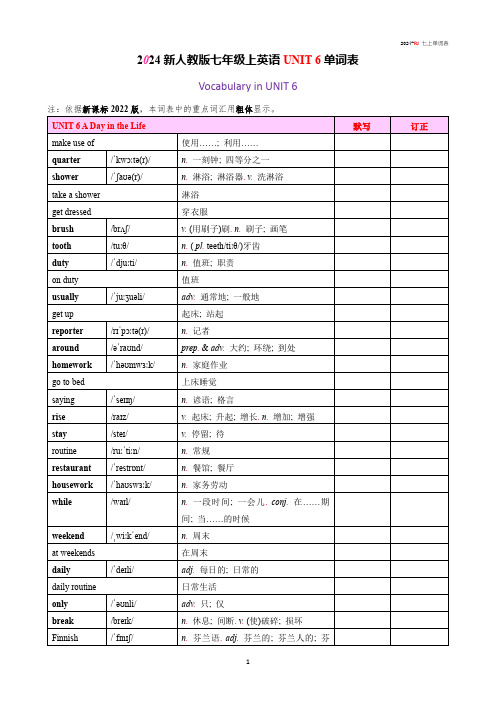
n.淋浴;淋浴器.v.洗淋浴
take a shower
淋浴
get dressed
穿衣服
brush
/brʌʃ/
v.(用刷子)刷.n.刷子;画笔
tooth
/tuːθ/
n.(pl.teeth/tiːθ/)牙齿
duty
/ˈdjuːti/
n.值班;职责
on duty
值班
usually
/ˈjuːʒuəli/
/ˈevrideɪ/
adj.每天的;日常的
prepare
/prɪˈpeə(r)/
v.把……备好;准备
prepare sth for
为……把某物准备好
Timo
/ˈtiːməʊ/
蒂莫
Halla
/ˈhɑlɑ/
哈拉
Helsinki
/helˈsɪŋki/
赫尔辛基(芬兰首都)
Finland
/ˈfɪnlənd/
芬兰
stay
/steɪ/
v.停留;待
routine
/ruːˈtiːn/
n.常规
restaurant
/ˈrestrɒnt/
n.餐馆;餐厅
housework
/ˈhaʊswɜːk/
n.家务劳动
while
/waɪl/
n.一段时间;一会儿.conj.在……期间;当……的时候
weekend
/ˌst/
n.早餐
before
/bɪˈfɔː(r)/
prep.&conj.在……以前.adv.以前
begin
/bɪˈɡɪn/
v.开始
dinner
/ˈdɪnə(r)/
最新人教版七年级上册英语Unit 6 A day in the life拔高训练卷及答案

最新人教版七年级上册英语Unit 6 A day in the life拔高训练卷及答案考试时间:90分钟满分:120分姓名:得分:一、根据句意及首字母提示填词。
(10分)1. My brother is good at r and he runs very fast.2. My sister Linda gets up at half p seven every day.3. Scott b his teeth after he gets up.4. Linda takes a s every evening.5. My little sister likes 1 to music very much.6. Can you f your homework first and then watch TV ?7. Let's go to school at h past seven.8. Tony just wants to have a happy and healthy l .9. We u go to school from Monday to Friday and have two days off on weekends.10.My uncle is a farmer in a small v .二、用所给词的适当形式完成句子(10分)1. Mr. Green always (have) two eggs, some bread and milk for breakfast.2. Sally has a good habit. She always finishes (brush) her teeth before going to bed in the evening.3. Scott usually (eat) breakfast at a funny time—At 8:30 at night.4. We often (play) basketball and soccer in the playground.5. James (study) English, Chinese, math,science and art at school.6. Dick (not go) to the zoo on Sun-day.7. He (teach) us English on Sundays.8. Mike (do) English homework every day?9. Steve usually (help) his mom (clean) the house on Saturdays.10. I want (know) about your school days. Can you tell me?三、完形填空。
UNIT 6 A_Day's_wait_(Unit_6)
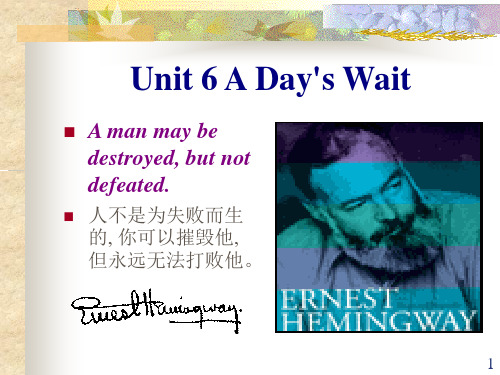
雨水飘雪将使我们冷的打颤。 Rain and snow will shiver us . 想到他可能会被车撞到,我就吓得发抖 。 I shiver at the idea he could've met a car crash .
12
3. capsule 胶囊;
这个病人不喝水就吞下了胶囊 。 The patient swallowed the capsule without drinking water . Tablet 药片 。 Pill 药丸。
Unit 6 A Day's Wait
A man may be destroyed, but not defeated.
人不是为失败而生 的, 你可以摧毁他, 但永远无法打败他。
1
Warming-up Activities
How much do you know about the writer of the passage ---- Ernest Hemingway? Can you tell us some of his works?
commence to do sth
26
17. thermometer 温度计;
我们用温度计测量温度 。 We measure the temperature with a thermometer .
27
18. gaze指“由于惊讶、好奇、喜悦、同情或感兴趣而目不转睛地 看”, 如: What are you gazing at? 你在凝视什么? stare指“睁大眼睛、目不转睛地盯着看”, 如: It's rude to stare at people. 盯着看人不礼貌。 glare指由于“羡幕、恐惧、惊讶或愚蠢而用恐吓、凶狠或愤怒的眼 光看”, 如: He glared at her. 他向她瞪眼。 peek指“偷看”、“通过孔隙窥视”, 如: You must not peek while you are counting in such games as hide-andseek. 象捉迷藏一类游戏中, 你数数时绝对不能偷看。 peer指“细看”, 如: He was peering down the well. 28 他细看下面的井。
Unit 6 A Day in the Life 综合素质评价人教版(2024)英语七年级上册

Unit 6 A Day in the Life 综合素质评价(限时: 120分钟满分: 120分)第一部分(听力共30 分)I. 听选答案(共15 小题, 计20 分)第一节: 听下面10 段对话,每段对话后有一个问题, 读两遍。
请根据每段对话的内容和后面的问题, 从所给的三个选项中选出问题的正确答案。
(共10 小题, 计10 分)( ) 1. A. At 5:50. B. At 6:00.C. At 6:10.( ) 2. A. The guitar. B. The violin.C. The piano.( ) 3. A. He watches TV. B. He plays games.C. He plays the guitar.( ) 4. A. Her father. B. Her mother.C. Her grandparents.( ) 5. A. He does homework. B. He watches TV.C. He eats dinner.( ) 6. A. At 7:10 a. m. B. At 6:50 a. m.C. At 7:00 a. m.( ) 7. A. 8:15. B. 8:30.C. 8:45.( ) 8. A. Tom. B. Tom’s brother.C. Tom’s father.( ) 9. A. In the morning. B. In the afternoon.C. In the evening.( ) 10. A. At six o’clock. B. At seven o’clock.C. At about nine o’clock.第二节: 听下面两段材料, 包括一篇独白和一段对话,每段材料后有几道小题。
请根据材料的内容, 从题目所给的三个选项中选出问题的正确答案。
每段材料读两遍。
(共5 小题, 计10 分)听第1 段材料, 回答第11、12 小题。
剑桥国际少儿英语KB3_Unit6_A_day_in_the_country

Say it with Stella
paper plane
lake
Jack
homework
Find out the opposite words from page54-57, and write them down. Read p56-57.
People need food to eat.
People need air to breathe.
People need water to drink.
Plants give us paper, wood, medicine and material for clothes.
Photo frame
grass
vegetables trees
plants
flowers
Can you name seven plants people eat?
Plants give us a lot of things to eat. We can eat the seeds, the leaves, the fruit and roots of the plant.
I think it’s dead.
知识回顾 Knowledge Review
祝您成功!
revision
Remember! Lock and Key are at a party. What’s the name of the picture? What do they eat? And then, What happens?
Today what are they going to do?
leaves
seeds fruit
Unit 6 A Day's Wait
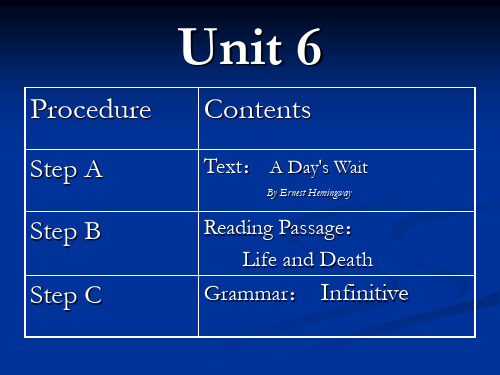
Procedure Contents
Step A Step B Step C
Text: A Day's Wait
By Ernest Hemingway
Reading Passage: Life and Death
Grammar: Infinitive
Background
Death & Courage
Jenny was still standing at the gate gazing at the end of the road long after the car was out of sight.
As far as I know, they have been emotionally detached from each other for some time.
para.23 if it bothers you. (it=death in the son’s mind)
para.24 “It doesn't bother me.” (it=flu in the dad’s mind)
para.25 it's going to bother you ( the same as it in para.23)
Part1 (para.1-13) : The son was ill and
diagnosed a light flu.
para.1 while we were still in bed. (trans.)
he walked slowly as though it ached to move. (trans.)---
para.37 “but I can't keep from thinking.” = but I can't help thinking of death
人教版七年级上册英语Unit6 A day in the life阅读能力提升综合试题及答案(二)

人教版七年级上册英语Unit6 A day in the life阅读能力提升综合试题及答案(二)Passage1短文填空。
阅读短文,从方框中选择恰当的词并用其正确形式填空,使文章通顺、完整。
每空只能填写一个单词,每词限用一次。
方框中有两个词是多余的。
Hello, everyone! My name is Ling-ling, an American 1 . Jenny and Cindy are my good 2 , and we are also in the same school. Jenny and I 3 in Class Six, Grade Seven, but Cindy is in Class Ten, Grade Seven. All of us get up at half 4 six in the morning and get to school at a quarter to eight. Jenny and I have English at nine o'clock in the morning and Cindy 5 English at ten o'clock. Do you know English is my 6 subject? Jenny and Cindy like Chinese very much. We all like having history and geography. We have 7 at school. For lunch, we usually have rice, 68 and chicken.In the afternoon, at two o'clock we have art in our art classroom. 9 school we often play sports, and we all like to play 10 . Sometimes we play the guitar and the violin. But we never watch TV because it is bad for eyes. We usually do our homework together in my home.1. 2. 3. 4. 5.6. 7. 8. 9. 10.Passage2完形填空It's Friday evening. Mom comes to Lily's room and says,“Lily, your room is in a mess(杂乱). Can you 1 it, please?”But Lily doesn’t 2 to do that. Mom says,“Lily, you must clean 3 room on weekends.”The next day is 4 . Lily gets up and draws some red spots(斑点) on her face.“Good,”she says,“I 5 sick(生病的).”When Mom comes in, Lily 6 Mom. Mom looks at the spots and 7 ,“You have to stay in bed(卧床休息), Lily.”Lily stays in bed all the weekend. Then she says,“I'm 8 now.”But Mom says,“No, you're not. I can still 9some spots. You can't get out of 10 !”Lily has to stay in bed 11 days. Then she asks,“Can I get out of bed now?” 12 Mom says no. Lily looks at her 13 . It's really in a mess. She doesn't like it now. So Lily 14 cleans her room! “Lily,”Mom says,“I can’t see your spots. And your room is 15 . Are you OK?”And Lily says,“Yes! I love my clean room!”( )1. A. take B. buy C. sell D. clean( )2. A. need B. want C. have D. help( )3. A. his B. her C. your D. their( )4. A. Saturday B. Sunday C. Monday D. Tuesday( )5. A. look B. sound C. get D. make( )6. A. thanks B. teaches C. tells D. talks( )7. A. says B. asks C. plays D. walks( )8. A. fat B. fine C. late D. short( )9. A. draw B. watch C. meet D. see( )10. A. desk B. sofa C. bed D. chair( )11. A. after B. in C. with D. for( )12. A. And B. But C. Or D. So( )13. A. room B. box C. store D. bag( )14. A. only B. really C. early D. quickly( )5. A. small B. big C. tidy D. oldPassage3Scott is an English boy. He is in Shanghai with his parents now. They work in Shanghai, and Scott studies Chinese and kung fu in Shanghai.He is in No.6 Middle School. He gets up early and exercises for half an hour every day. He is never late for school. He studies hard. He can read and write English well. He usually helps us with our English, and we usually help him with his Chinese. He practices Chinese kung fu after school in a club. Some-times he helps his mother clean the rooms on weekends.He likes Chinese food very much. He thinks lots of Chinese food tastes good. He has lots of friends here. He is friendly to us and we like to play with him.根据材料内容选择最佳答案。
Unit 6 A Day in the Life词汇知识点详解

while
时间状语 从句
1)conj.在 … 期 间 ; 当 … 的 时 候=when • Her parents died while she
was still at school. • 她还在读书时父母就去世
了 • You can go swimming while
I'm having lunch. • 我吃午饭时你可以去游泳
Unit 6 A Day in the LIfe
重点词汇知识点详解
shower n.淋浴,淋浴器
• I think I'll go home and have a shower. • 我想我要回家冲澡了。 • I think I'll take a shower before dinner. • 我想晚饭前我要来次淋浴。
routine n.常规
daily routine 日常生活;日常工作
Make exercise a part of
your daily routine . 让锻炼成为你日常生活的 一部分
restaurant n.餐馆,餐厅
chinese restaurant 中餐厅;中餐馆
We had a meal in a restaurant. 我们在餐厅吃了顿饭
around the world 全世界
homework n.作业 不可数名词 • How much homework do you get? • 你有多少家庭作业? • I'll do my homework after supper. • 晚饭后我要做家庭作业。 • I've got a lot of homework tonight. • 我今晚有很多家庭作业要做。
2024人教版七上【学习任务单Unit 6 A Day in the Life (Period 2)
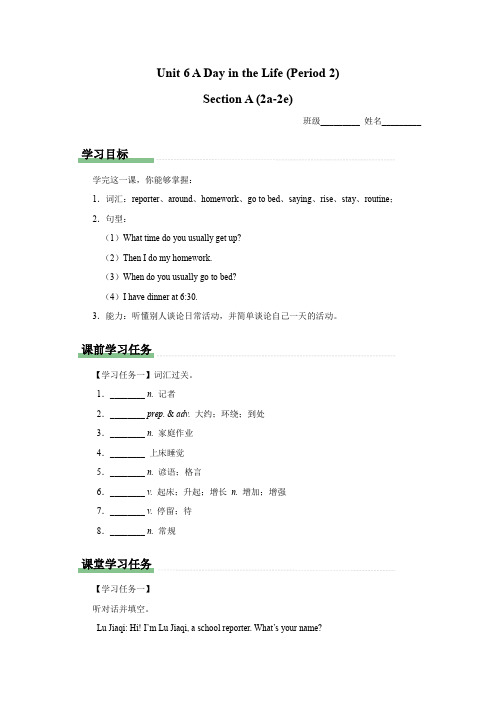
Unit 6 A Day in the Life (Period 2)Section A (2a-2e)班级_________ 姓名_________学习目标学完这一课,你能够掌握:1.词汇:reporter、around、homework、go to bed、saying、rise、stay、routine;2.句型:(1)What time do you usually get up?(2)Then I do my homework.(3)When do you usually go to bed?(4)I have dinner at 6:30.3.能力:听懂别人谈论日常活动,并简单谈论自己一天的活动。
课前学习任务【学习任务一】词汇过关。
1.________ n.记者2.________ prep. & adv.大约;环绕;到处3.________ n.家庭作业4.________ 上床睡觉5.________ n.谚语;格言6.________ v.起床;升起;增长n.增加;增强7.________ v.停留;待8.________ n.常规课堂学习任务【学习任务一】听对话并填空。
Lu Jiaqi: Hi! I’m Lu Jiaqi, a school reporter. What’s your name?Tom: Tom.Lu Jiaqi: So Tom, what time do you usually get up?Tom: At 6:45.Lu Jiaqi: And then?Tom: I have breakfast at about ________. Then I go to school at 7:50.Lu Jiaqi: When do you go home?Tom: Around ________.Lu Jiaqi: What do you do after that?Tom: Sometimes I play basketball. I have dinner at ________. Then I do my homework. Lu Jiaqi: When do you usually go to bed?Tom: At ________.Lu Jiaqi: That’s early!Tom: Well, you know the saying, “Early to bed, early to rise!”【学习任务二】读2a对话,回答问题。
2024年秋季新人教版七 Unit 6 A Day in the Life 知识点+练习卷(含答案)
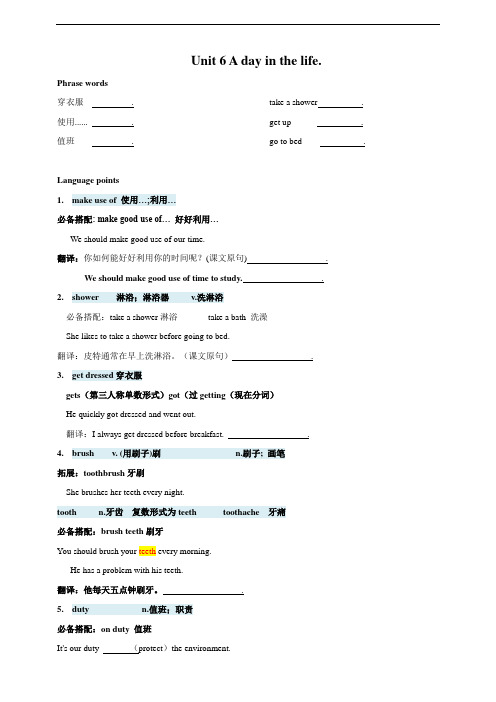
Unit 6 A day in the life.Phrase words穿衣服. take a shower . 使用...... . get up . 值班. go to bed .Language points1.make use of 使用…;利用…必备搭配: make good use of… 好好利用…We should make good use of our time.翻译:你如何能好好利用你的时间呢?(课文原句) .We should make good use of time to study..2.shower 淋浴;淋浴器v.洗淋浴必备搭配:take a shower淋浴take a bath 洗澡She likes to take a shower before going to bed.翻译:皮特通常在早上洗淋浴。
(课文原句).3.get dressed穿衣服gets(第三人称单数形式)got(过getting(现在分词)He quickly got dressed and went out.翻译:I always get dressed before breakfast. .4.brush v. (用刷子)刷n.刷子; 画笔拓展:toothbrush牙刷She brushes her teeth every night.tooth n.牙齿复数形式为teeth toothache 牙痛必备搭配:brush teeth刷牙You should brush your teeth every morning.He has a problem with his teeth.翻译:他每天五点钟刷牙。
.5.duty n.值班;职责必备搭配:on duty 值班Who is duty tonight?翻译:I’m on duty today..医生在医院值班。
.ually adv.通常地;一般地He usually gets up early.She usually goes to the park on Sundays.翻译:Lily通常在晚上洗澡。
Unit6ADayintheLife课时2SectionA(12e)

2b Read the conversation and answer the questions.
1.What does Jiaqi ask Tom about?
His name and daily routines.
2. How long does Tom stay at school?
About 9 hours.
play basketball He plays basketball before dinner.
have dinner
He has dinner at 6:30 p.m.
do homework He does homework after dinner.
go to bed
He goes to bed at 9:30 p.m.
2a Listen to the conversation and fill in the blanks.
Lu Jiaqi: Hi, I am Lu Jiaqi, a school reporter. What’s your name? Tom: Tom. Lu Jiaqi: So Tom, what time do you usually get up? Tom: At 6:45. Lu Jiaqi: And then? Tom: I have breakfast at about_7_:_1_0__. Then I go to school at 7:50. Lu Jiaqi: When do you go home? Tom: Around____5_:_0_0_______. Lu Jiaqi: What do you do after that? Tom: Sometimes I play basketball. I have dinner at__6_:3_0__. Then I do my homework. Lu Jiaqi: When do you usually go to bed? Tom: At___9_:_3_0______. Lu Jiaqi: That’s early! Tom: Well, you know the saying, “Early to bed, early to rise!”
Unit 6 A Day in the Life (Period 6)单元复习卷(含答案)

Unit 6 A Day in the Life (Period 6)单元复习课(时间:60分钟分值:80分)一、单项选择。
(每小题1分,共5分)1.We have a ________ break between ________.A.10 minutes; lesson B.10 minutes; lessonsC.l0-minute; lesson D.10-minute; lessons2.I take a shower ________ 6:30 ________ Monday morning.A.in; on B.at; on C.at; in D.on; on 3.Turn on the light(开灯). It’s too ________ in the room.A.dark B.hot C.boring D.useful 4.It’s already 7:30. It’s time ________ my son ________ breakfast.A.for; has B.with; to have C.for; to have D. with; has 5.—Let’s go shopping to buy some ________ things.—I’m sorry. I can’t go with you. I must prepare ________ dinner.A.everyday; to B.everyday; for C.every day; to D.every day; for 二、完形填空。
(每小题1.5分,共15分)It’s 5:30 in the morning and George must get up. He takes a shower and makes ____6____ for his family. ____7____ people are in this family: George, George’s wife(妻子) and ____8____ three daughters. Everyone likes different food, so it’s always ____9____ for George to ____10____ food. After breakfast, George needs to go to work. He works in a middle school and he ___11___ history. He is a good teacher and all of his students ____12____ him. He goes home after he ____13____ his work. He usually gets home at about 6:00. In the evening he has fun ____14____ his family. He usually plays tennis or watches TV with his daughters ____15____ he goes to bed before 11:00.6.A.lunch B.breakfast C.dinner D.homework 7.A.Three B.Four C.Five D.Six 8.A.he B.your C.their D.our 9.A.difficult B.healthy C.right D.easy10.A.eat B.have C.prepare D.finish 11.A.loves B.teaches C.knows D.needs 12.A.like B.meet C.join D.call 13.A.makes B.has C.finishes D.plays 14.A.on B.about C.for D.with 15.A.so B.or C.but D.and 三、阅读理解。
- 1、下载文档前请自行甄别文档内容的完整性,平台不提供额外的编辑、内容补充、找答案等附加服务。
- 2、"仅部分预览"的文档,不可在线预览部分如存在完整性等问题,可反馈申请退款(可完整预览的文档不适用该条件!)。
- 3、如文档侵犯您的权益,请联系客服反馈,我们会尽快为您处理(人工客服工作时间:9:00-18:30)。
Unit 6 A Day's Wait Study&Practice
prehension of the Text
1)b 2)c 3)d 4)c 5)b 6)a 7)b 8)c III. Vocabulary Activities
1.
1) prescribed
2) shiver
3) scattered
4) acid
5) slid
6) slipped
7) flushed
8) poised
9) take it easy
10) varnishing
11)slack
12)epidemic
2.
1) flushed
2) keep from
3) gaze
4) icy
5) commenced
6) shiver
7) hold tight onto themselves
8) scattered
9) out of sight
10) overcome
3.
1) brought down
2) wrote down
3) is going on
4) hold onto
5) look up
6) woke up
7) keep from
8) worry about
4.
1) The story of his adventures makes good reading.
2) We've made 80 miles since noon.
3) George makes $250 a week.
4) I make the distance 12 miles.
5) If you work hard you'll make a good engineer.
6) Twelve inches make one foot.
7) One swallow does not make a summer.
8) That event made the headlines in all the big newspapers.
5.
1) three tenths
2) two thirds
3) a / one quarter
4) three quarters
5) four ninths
6) four fifths
IV. Enriching Your Word Power
1.
1) thermochemistry : the branch of chemistry dealing with the relations between chemical action and heat
2) thermodynamics: the branch of physics that deals with the relations between heat and other forms of energy or work, and the conversion of one into the other
3) thermoelectron: a negatively charged particle given off by a heated body
4) thermology: the science of heat
5) thermomagnetic: of or having to do with the effect of heat as modifying the magnetic properties of bodies
6) thermomotor: an engine driven by the expansive power of heated air or other gas
7) thermonuclear : of or having to do with the fusion of atoms through very high temperature
8) thermotherapy: therapy in which heat is used
V. Usage
1) I'd rather not talk about it
2) I'd rather you didn't
3) I'd rather you went back there now
4) 'd rather have a quiet night in front of the TV
5) I would rather go early
6) 'd rather you didn't smoke in our office
VI. structure
1.
1) I knocked several times before an elderly lady answered the door.
2) Marcus practised three long years before he made the school boxing team.
3) We waited five hours before the runway was cleared of heavy snow and made ready for takeoff.
4) It will be five years before we meet again.
5) He sent in three applications before he obtained permission to set up an experimental workshop.
6) It will be months before he is fit for work.
2.
1) The point under discussion is of vital importance.
2) I wish I could be of help.
3) This discovery would be of great significance to the study of the subject.
4) I think her advice is of no value to us.
5) This dictionary is of little use to beginners of English.
VII. Cloze
1.
1) prescribed
2) bring down
3) overcome
4) gazed
5) miserable
6) shiver
7) flush
8) detached from
9) keep from
10) slid
11) take it easy
2.
1)house
2)floor
3)opened
4)out
5)smoke
6)as
7)instead
8)thicker
9)around
10)my
11)But
12)fell
13)felt
14)from
15)and
16)wood
17)in
18)When
19)surprise
20)gathered
21)in
22)crowd
23)out
24)saved
VIII.Translation
1) 装了(fitted with) 假肢(artificial leg),他起初走路走不稳,但经过锻炼他的步子(step) 稳了。
Fitted with the artificial leg, he walked unsteadily / shakily at first, but with practice his steps became steady.
2) 医生说我得了重感冒,给我开了四种药,三种是药片,饭后服,另一种是药水(liquid),睡前服。
The doctor said I had caught a severe cold and she prescribed me four different medicines. Three of them are pills to be taken after meals and the other is liquid to be drunk before going to bed. 3) 我妹妹的爱犬被人偷走后,她心里难受了好几个星期。
My sister felt miserable for weeks after she had her pet dog stolen.
4) 汽车早已开走看不见了,珍妮(Jenny) 还站在大门口凝视着路的尽头。
Jenny was still standing at the gate gazing at the end of the road long after the car was out of sight.
5) 就我所知,他们相互感情上疏远已有一些时间了。
As far as I know, they have been emotionally detached from each other for some time.
6) 一般来说,通过增加供给或减少需求可以降低物价。
In general, prices may be brought down by increasing supply or decreasing demand.。
